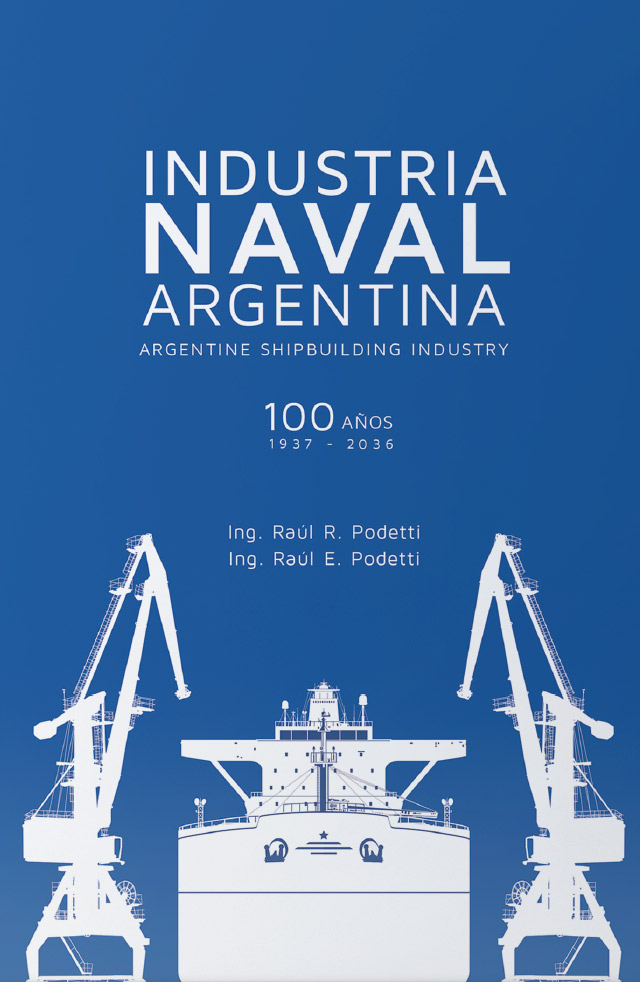The authors, Raúl Podetti Sr. and Jr., have jointly dedicated 100 years to this industry. In this book they contribute their visions as players of the sector, having managed private and public maritime companies as well as professional associations and industrial chambers.
This work on Shipbuilding Industrial Policy covers the history of the activity, offering a rigorous (and unique) qualitative-quantitative analysis of the sector’s performance that studies and discusses the cause-effect relationships between state and development policies and finishes with proposals.
Its first three parts (History, Industry and Politics) span 80 past years, from the beginning of the modern shipbuilding industry in 1937 to the present. The fourth part projects the next 20 years of a possible and necessary future for Argentina to recover this virtuous activity.
The SANYM chapter, where the authors narrate in first person the origin, development and forced closure of their own shipyard, stands out. This shipyard generated more than a thousand jobs and exported a third of its production to Europe, Africa and America.
In the Global Context, the shipbuilding industries of more than 20 countries are analysed and mapped according to the wealth-development relationship of their shipbuilding industry, creating ‘continents’ to form a new naval planisphere. Here the Argentine navigation course is shown and the current one is discussed.
Regarding state roles, (Regulator, Owner and Shipyard) are analysed. A detailed analysis is made of the State-Shipyard role, comparing the cases of TANDANOR and Río Santiago yard with those of many state-owned shipyards in the world and the region.
One of the most controversial chapters is that of ‘Naval Cases’, where the investigation of specific cases that negatively affect the country is presented with descriptions, anecdotes, identification of those responsible and calculations of impact on employment, tax collection and foreign exchange losses. Reference is made to historical difficulties (ARA, PNA, Fishing and Waterway) and recent cases (OPV, Patrol Boats, INIDEP, ENARSA). The impacts of the bad decisions are quantified and an analysis is made that unmasks the modus operandi and the system that financed one of the worst sector policies in the country.
The last part presents conceptual and concrete proposals for the relaunch of the sector, planning possible scenarios until 2036, thus completing the analysis of one hundred years of the Argentine shipbuilding industry.
Disponible

“True dimension of the activity.
This has been a great challenge in which the authors portray their point of view as key players in the history and future of the national shipbuilding industry”.
Juan Antonio Torresin
President – Federación de la Industria Naval Argentina

“A clear view of our sector.
This is a story about commitment with Podetti Sr. and Jr., together with whom myself and many others defended the activity, establishing common positions to face political power, sharing frustrations and pain in the face of misunderstanding.
This is a very valuable contribution that will build awareness of an industry that should be the pride of all the people of Argentina.”
Juan Speroni
General Secretary – Sindicato Argentino de Obreros Navales

“Mandatory reading. I welcome this magnificent work!”
An essential instrument to understand the incomprehensible public policies that target the shipbuilding industry to marginalization.
It is full of very valuable information and presents it in a very intelligent way, which makes its reading both fruitful and enjoyable.
Podetti Sr. and Jr. give us the chance of an interesting future, with sustained work and possibilities of consolidation”.
Carlos M. Brañas
President – Asociación Argentina de Ingeniería Naval

“A basis for the reflection on the future of this industry.
The cause-effect relationships of the policies applied for decades are clearly shown. It helps to understand how the development of the shipbuilding industry is strongly related to the value added and jobs generated.
The authors’ suggestions on the last chapter seem to be an excellent basis for the debate on the future of this industry”.
José Ignacio de Mendiguren
President – Industry Committee – National Chamber of Deputies

“It is the chance to learn about this sector!
This book, simple and entertaining, serves to clearly understand what happened in a sector that operates throughout the world with strong public/private articulation.
The authors, of whose passion for the naval industry I know of, suggest a possible and competitive shipbuilding industry that Argentina could have”.
Martin Berardi
Executive Vice President Ternium
Raúl R. Podetti
Born in Villa Mercedes, San Luis, Argentina, he attended the Military Naval School (80th graduating class), and later graduated as Naval Architecture and Marine Engineering from the University of Buenos Aires. Upon retiring from the Navy as Lieutenant, in 1964 he co-founded a marine engineering firm named SANYM – Society for Marine and Mechanical Applications – with Rolando Marini, which later evolved as a dynamic shipyard, specializing in middle-sized ships, with a strong exporting bent.
He also set up SIPIN-AFNE, the largest public-private consulting firm of marine technology of its time, which designed the most significant ships planned and built in the country.
He has been a strenuous institutional advocate and promoter of Argentina’s marine engineering and industry, an activity which he engaged in up to the end of 2017, actively participating in the leadership of the Argentine Association of Naval Engineering (AAIN, in Spanish) and of the Federation of the Argentine Shipbuilding Industry (FINA, in Spanish).
In July 2019 he passed away, giving us his legacy.









